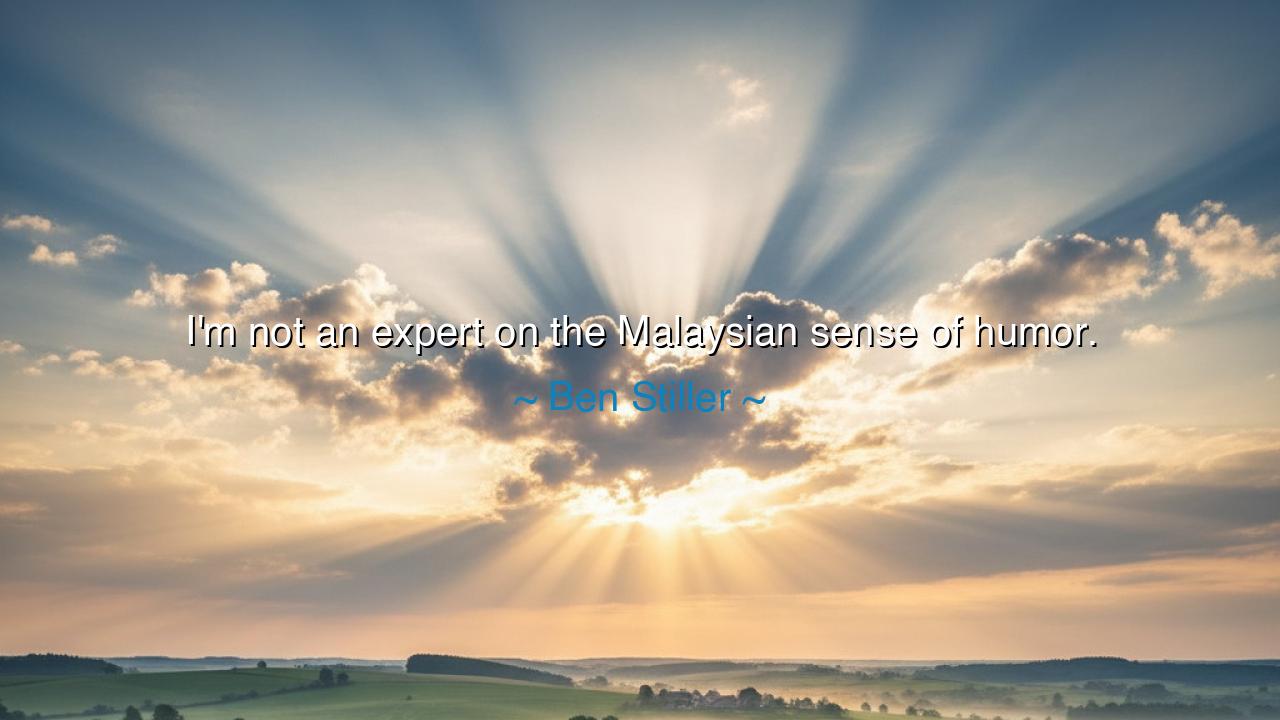
I'm not an expert on the Malaysian sense of humor.






The words of Ben Stiller—“I’m not an expert on the Malaysian sense of humor”—may at first seem modest, even casual, yet within them lies a lesson of profound humility and understanding. For in this simple admission, Stiller, a master of comedy and satire, acknowledges a truth that transcends culture and art: that humor, like the human spirit itself, is bound to the soil of its people, to their history, their language, and their pain. To claim mastery of another’s laughter would be to claim mastery of their soul—and this, the wise know, cannot be done. His statement is thus not ignorance, but reverence. It is the wisdom of the traveler who knows that what amuses one tribe may offend another, and that to laugh with respect is a bridge, but to laugh without understanding is a blade.
In speaking these words, Stiller recognizes that humor is a mirror of identity. It reflects the values, fears, and dreams of those who hold it. The laughter of a people arises not merely from jest, but from shared memory—of what they have endured, and how they have chosen to see it. The Malaysian sense of humor, born from a tapestry of diverse cultures—Malay, Chinese, Indian, and indigenous—has its own rhythm and grace. It draws from harmony and contradiction alike, from a history of colonial rule, spiritual faith, and the modern dance between East and West. For an outsider to observe it requires not expertise, but empathy; not imitation, but listening.
The origin of Stiller’s reflection likely arose from his experiences as a global entertainer, as his work traveled beyond American shores and met audiences of different worlds. In his craft, he learned what the ancient philosophers of communication already knew: that every form of expression must bow to context, for words and gestures do not exist in a void. What one nation calls satire, another may call insult. What one finds absurd, another finds sacred. And so, the wise performer, like the wise diplomat, learns first to observe before speaking, to study before jesting, and to honor before interpreting.
In this humility, we find echoes of Herodotus, the ancient historian who traveled across lands seeking the stories of nations. He wrote that to understand a people, one must first walk among them, eat their bread, and listen to their laughter. For laughter reveals truth without words—it unveils the spirit behind the face. In one tale, Herodotus describes how Persians and Greeks, though enemies in battle, shared moments of humor that transcended politics; it was in those shared laughs that they recognized their common humanity. So too, Stiller’s words remind us that humor, though universal in its need, is local in its form—and that to truly connect, we must approach it with both curiosity and humility.
Consider also the story of Charlie Chaplin, whose silent films carried laughter to every corner of the world. Without words, he spoke a language that transcended borders, yet even he admitted that his humor was born from poverty and struggle, from a very English understanding of irony and endurance. When he traveled to other lands, he saw that their laughter was colored differently—sometimes warmer, sometimes sharper—but always true to their own experience. Chaplin’s success lay not in imposing his humor upon others, but in uncovering the thread of humanity that ran through all laughter. He found universality not by ignoring difference, but by respecting it.
Thus, Ben Stiller’s remark becomes a lesson in humility for all who create, speak, or teach. It reminds us that wisdom begins with the words, “I am not an expert.” For the moment one admits the limits of one’s understanding, one opens the door to deeper learning. To approach another culture’s humor—or any aspect of its identity—without pretense is to offer respect. To listen before speaking is to show reverence. The fool assumes that laughter is the same everywhere; the sage knows that behind every laugh lies a lifetime of stories.
Let this be the lesson passed down: seek to understand before you seek to express. When you enter a new culture, a new conversation, or even another person’s pain, approach as a student, not a master. Do not assume that your own ways are universal, for the human heart is vast and varied. Watch how others laugh, and learn what moves them. And in time, you will discover that humor, though different in every land, springs from the same source—the desire to lighten the burdens of life and to connect through joy.
So remember the quiet wisdom of Ben Stiller’s words. They are not a denial of knowledge, but an embrace of humility. To say, “I’m not an expert on the Malaysian sense of humor,” is to honor the mystery of humanity—to admit that understanding others fully is not a task to be completed, but a journey to be cherished. In that humility lies the truest form of wisdom: to know that every culture’s laughter is a sacred song, and that the wise man does not seek to rewrite it—he seeks to listen, to smile, and to join in harmony when invited.






AAdministratorAdministrator
Welcome, honored guests. Please leave a comment, we will respond soon